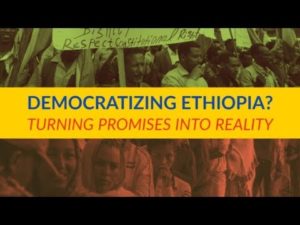 The number of people detained over the deadly violence which broke out near Ethiopia’s capital, Addis Ababa, on Saturday has risen to 200, BBC News reports (HT: FDD).
The number of people detained over the deadly violence which broke out near Ethiopia’s capital, Addis Ababa, on Saturday has risen to 200, BBC News reports (HT: FDD).
After taking office in March, Prime Minister Abiy Ahmed of Ethiopia officially ended two decades of hostilities with Ethiopia’s longtime rival and neighbor, Eritrea, the New York Times adds:
Beyond that, he started loosening a tightly controlled state-run economy, pledged multiparty elections in a country long known for jailing dissidents and began wooing the government’s most strident critics: members of the Ethiopian diaspora, who have long organized insurgencies from afar. Leaders of a previously outlawed opposition group returned to the capital on Saturday. ….
 Many of Mr. Abiy’s promises remain just that. He has yet to lift restrictions on civil society, and it’s unclear how multiparty elections can be held, as he has promised, in a country where the governing coalition and its allies have sweeping control over almost all institutions — and hold every seat in Parliament. Representative Karen Bass, a California Democrat, who met with Mr. Abiy in late August, lauded his changes but warned of the risks of soaring demands.
Many of Mr. Abiy’s promises remain just that. He has yet to lift restrictions on civil society, and it’s unclear how multiparty elections can be held, as he has promised, in a country where the governing coalition and its allies have sweeping control over almost all institutions — and hold every seat in Parliament. Representative Karen Bass, a California Democrat, who met with Mr. Abiy in late August, lauded his changes but warned of the risks of soaring demands.
 “He has delivered, but if life doesn’t change for everyone, people get impatient…..People have unrealistic expectations,” said Bass (left), a board member of the National Endowment for Democracy, the Washington-based democracy assistance group.
“He has delivered, but if life doesn’t change for everyone, people get impatient…..People have unrealistic expectations,” said Bass (left), a board member of the National Endowment for Democracy, the Washington-based democracy assistance group.
Bass acknowledged other daunting obstacles: “Regional security issues, the country’s past human rights records [and] ethnic tensions across the country and hard-liners” among the ruling Ethiopian People’s Revolutionary Democratic Front party who hope to stall Abiy’s reform agenda, VOA adds.
 A recent flag controversy showcases the complexity of the political situation in Ethiopia and the challenges facing its ethnic federalism, Quartz reports:
A recent flag controversy showcases the complexity of the political situation in Ethiopia and the challenges facing its ethnic federalism, Quartz reports:
Since coming to power, Abiy has taken a number of bold steps aimed at mending relations with both domestic opposition and regional neighbors. Yet sporadic ethnic violence has continued despite the reforms in Africa’s second-most-populous nation—showcasing that much more needs to be done to unite the more than 80 ethnic groups in the country.
After living under an authoritarian regime for decades, young generations “need justice, need democracy, need freedom of speech,” one observer told Quartz.







